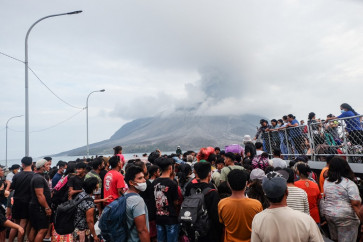Ministry softens stance on new zakat bill
The Religious Affairs Ministry appears to be losing its fight to pass its own proposed bill that aims to centralize the collection and management of alms, or zakat
Change Size

T
he Religious Affairs Ministry appears to be losing its fight to pass its own proposed bill that aims to centralize the collection and management of alms, or zakat.
A ministry official said Wednesday that the ministry had adopted a wait-and-see attitude, as legislators now seemed to have focused on their own initiative bill on the revision of the 1999 Zakat Mangement Law, which opposes the centralization of zakat management.
“However, we are still waiting for lawmakers to invite us to
discuss the possibility of deliberating the ministry’s zakat management bill,” head of the Directorate Office of Zakat Institutions
Development for the Religious
Affairs Ministry, Isbir Fadli, told The Jakarta Post.
He admitted that many societal groups had suggested the ministry not push its bill in the legislative process, as it would be considered as meddling in the interests of the Muslim-majority population.
The ministry’s bill stipulates that a new body would be formed under the auspices of the ministry to regulate, operate and monitor alms collection and distribution. It also supports sanctions on individuals who fail to donate zakat.
“Private operators will be amalgamated and required to join under the new body to make zakat management and operational processes easier,” Isbir said.
He added centralization was crucial to developing alms’ potentials across the country, and to monitoring the existence of dubious small private alms institutions. “There are thousands of private alms institutions that are not registered in the country, and many of them abuse alms donated by Muslims,” Isbir said.
Commenting on the bill initiated by legislators, Isbir lamented the fact that the legislative draft had come into being without any in-depth reviews, that it overlooked strategic and operational approaches to dealing with the current alms’ situation.
Separately, Prof. Didin Hafiduddin, director of the state-run alms management agency Badan Amil Zakat, said the agency would support any bill that endorsed the inception of a new institution that would coordinate both private and state-run zakat mangement agencies.
“In addition, we’d like to see a bill supporting administrative fines imposed on Muslim individuals who fail to donate alms,” he added.
The ministry’s idea of centralization and sanctions had come under harsh criticism from experts, civil society groups and privately run alms institutions, known as LAZ.
Amelia Fauzia, a lecturer at the State Institute of Islamic Studies in Surabaya, East Java, told the Post that the centralization would “kill” the existing private alms operators and disadvantage low-income recipients in remote areas.
“If the ministry is concerned about how it should monitor the existing unregistered small private alms agencies, centralization is not the solution to the problem,” adding the government had to provide more flexible registration processes adjustable to regulations.
She said the government could neither overlook nor ignore the roles of society-based zakat collectors, or bodies, such as mosques, in managing alms and empowering local societies through zakats. “They need to be acknowledged, as well,” she added.
Nana Mintarti of the Indonesia Magnificence of Zakat, known as IMZ, said that giving alms had been a philanthropic tradition, and it was considered “voluntary”. Henceforth, she continued, neither centralization nor imposing fines on those failing to donate alms was rational if seen through the lense of the state.
“The country is not an Islamic country. We have the 1945 Constitution that guarantees [freedom of] the private sector and civil society to take part in managing and collecting alms,” Nana said.
Nana added many grassroots groups and private alms institutions backed the bill that was being proposed by members of House of Representatives’ Commission VIII on religion, because it separated the state and non-state boundaries.
Khairunnisa, a member of the Commission VII, said the bill that she and her legislative fellows had proposed would clearly distinguish the roles of regulator, operators and monitoring agencies.
“A new body with the support of the Religious Affairs Ministry will be formed and will function only as regulator, while private
and state-run alms institutions will still maintain the operational functions of alms,” Khairunnisa said, adding that an independent body would be in charge of the monitoring mechanism. The bill on the revision of the 1999 Zakat Management Law is waiting for deliberation at the House. Khairunnisa said that Commission members had targeted to pass the bill by the end of this year.
A recent report from the IMZ states Indonesia is expected to receive around Rp 1.4 trillion (US$156.7 million) from alms donators by 2010, and there has been a significant increase in alms collected from society from Rp 61.3 billion to Rp 249.6 billion between 2004 and 2004. The IMZ says the country is seeing around 67.2 percent of annual growth in zakat. (tsy)









